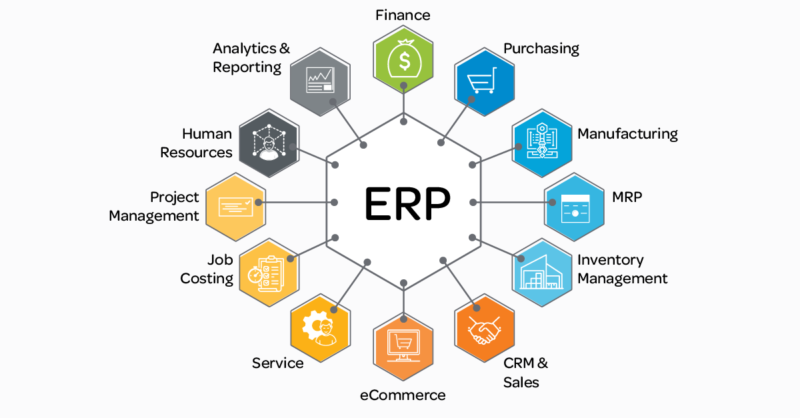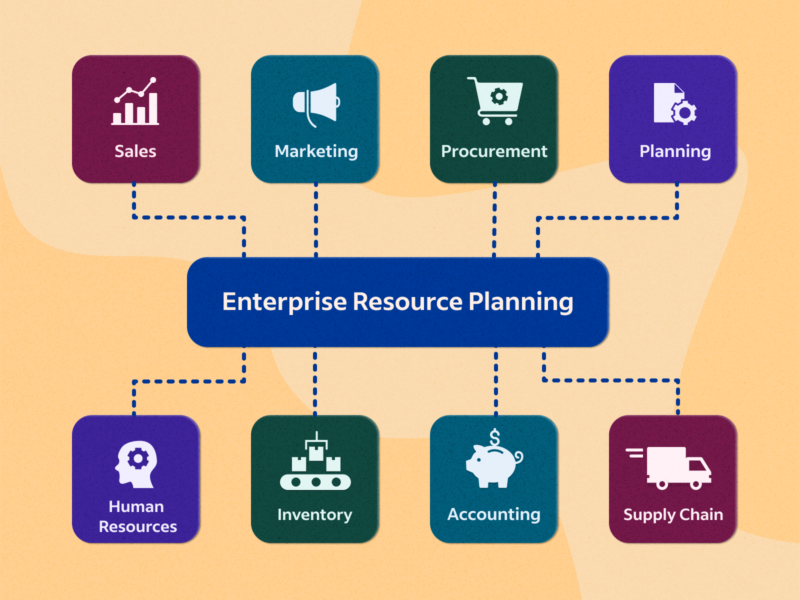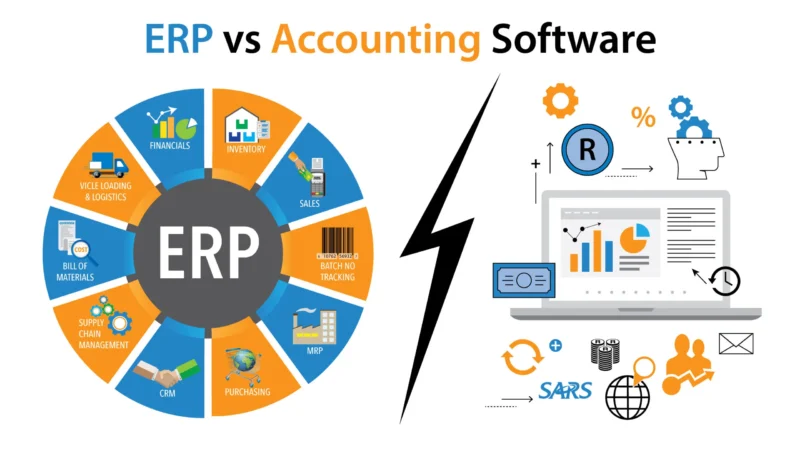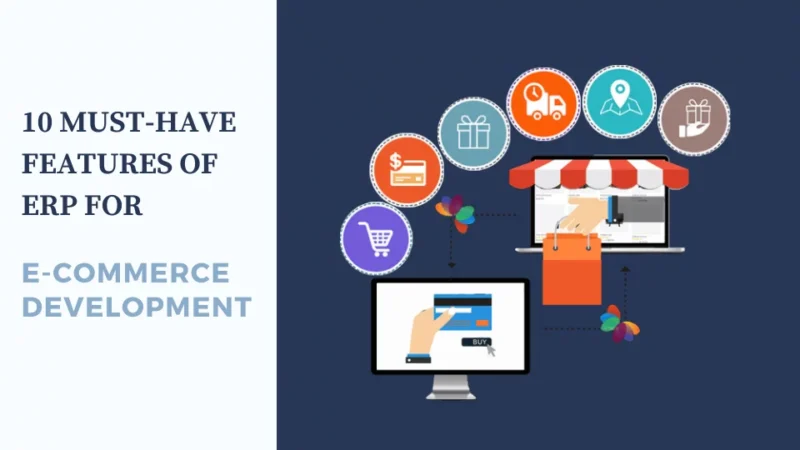Introduction
In today’s fast-paced business landscape, finding efficient ways to manage and streamline operations is essential for success. This is where commercial erp software comes into play. But what exactly is commercial ERP software, and why is it so crucial for businesses? Let’s dive in and explore the definition, importance, and the myriad of benefits it offers.
Mục lục

Definition and Importance of Commercial ERP Software
Commercial ERP software, also known as Enterprise Resource Planning software, is a comprehensive solution that integrates various business processes into a unified system. It allows organizations to manage core functions such as finance, human resources, supply chain, manufacturing, and customer relationship management (CRM) in one centralized platform.
Imagine having all your critical business data, from inventory levels to sales figures, accessible in real-time, with the ability to generate insightful reports and make data-driven decisions effortlessly. This is the power of commercial ERP software.
Overview of the Benefits and Functionalities
Commercial ERP software offers a plethora of benefits that can revolutionize the way you run your business. By implementing a robust ERP system, you can:
- Streamline Operations: Say goodbye to manual processes and data silos. With commercial ERP software, you can automate routine tasks, optimize workflows, and ensure seamless communication across departments. This allows for greater efficiency and productivity within your organization.
- Enhance Data Management: Data is the lifeblood of any business. Commercial ERP software provides a centralized database that enables efficient data management and integration. This means that information flows seamlessly between different modules, eliminating duplicate entries and ensuring data accuracy.
- Improve Decision Making: With real-time analytics and reporting capabilities, commercial ERP software empowers you to make informed decisions quickly. Access to up-to-date insights allows you to identify trends, pinpoint bottlenecks, and forecast demand accurately, giving you a competitive edge in the market.
- Achieve Scalability and Customization: As your business grows, so do your needs. Commercial ERP software offers scalable solutions that can adapt to the changing requirements of your organization. Additionally, it provides customization options to tailor the software to your specific industry and business processes.
In the next section, we will delve deeper into the key features of commercial ERP software, exploring how it can further enhance your business operations. So, let’s continue this exciting journey together.
Key Features of Commercial ERP Software

Commercial ERP software offers a wide range of key features that can transform the way you manage your business operations. Let’s explore these features in detail and understand how they can revolutionize your organization.
Comprehensive Data Management and Integration
One of the primary advantages of commercial ERP software is its ability to provide comprehensive data management and integration. By centralizing your business data into a single platform, you can eliminate data silos and ensure seamless communication between different departments. This integration allows for real-time data sharing, eliminating the need for manual data entry and reducing the risk of errors. With all your data in one place, you can gain a holistic view of your business and make better-informed decisions.
Streamlined Business Processes and Automation
Another key feature of commercial ERP software is its ability to streamline business processes and automate routine tasks. By automating repetitive tasks, such as generating invoices or processing payroll, you can free up valuable time and resources. This automation not only increases efficiency but also reduces the likelihood of errors that may occur during manual processes. With streamlined business processes, you can optimize workflows, improve productivity, and focus on strategic initiatives to drive growth.
Real-time Analytics and Reporting
Commercial ERP software provides robust analytics and reporting capabilities, allowing you to access real-time data insights. With customizable dashboards and reports, you can track key performance indicators (KPIs) and monitor the health of your business. These real-time analytics enable you to identify trends, spot potential issues, and make data-driven decisions promptly. Whether it’s tracking sales figures, monitoring inventory levels, or analyzing customer behavior, commercial ERP software puts powerful analytics at your fingertips.
Scalability and Customization Options
As your business evolves and expands, commercial ERP software offers the scalability and customization options to grow alongside you. With the ability to add new modules, users, and functionalities, you can adapt the system to meet the changing needs of your organization. Additionally, commercial ERP software allows for customization, ensuring that the software aligns with your industry-specific requirements and unique business processes. This flexibility empowers you to tailor the software to your organization’s needs, providing a solution that is truly fit for purpose.
In the next section, we will explore the factors to consider when choosing commercial ERP software, helping you make an informed decision that aligns with your business objectives. Let’s continue this exciting journey together.
Factors to Consider When Choosing Commercial ERP Software

When it comes to selecting the right commercial ERP software for your business, there are several crucial factors that you should consider. Let’s explore these factors to ensure that you make an informed decision that aligns with your company’s goals and requirements.
Business Requirements and Objectives
Before diving into the vast sea of available ERP software options, it’s essential to assess your business requirements and objectives. Take the time to identify the specific functionalities and features that your organization needs. Are you primarily focused on finance and accounting management? Or do you require robust inventory management capabilities? Understanding your unique needs will help you narrow down the options and find a software solution that caters to your specific requirements.
Industry-Specific Needs and Compliance
Different industries have specific regulations and compliance requirements. When choosing commercial ERP software, consider whether the software can meet these industry-specific needs. For example, if you operate in the healthcare sector, you may require software that complies with HIPAA regulations. Ensure that the ERP software you select aligns with the compliance standards and regulations relevant to your industry.
Integration Capabilities with Existing Systems
Most businesses already have existing systems and software in place. It’s crucial to evaluate the integration capabilities of the ERP software you are considering. Can it seamlessly integrate with your existing systems, such as CRM software, e-commerce platforms, or third-party applications? Smooth integration ensures that data flows seamlessly between systems, minimizing disruptions and maximizing efficiency.
Pricing and Implementation Costs
Budget is a significant factor when choosing commercial ERP software. Consider not only the initial purchase cost but also the implementation and ongoing maintenance costs. Some software solutions require substantial upfront investments, while others offer flexible pricing models, such as monthly subscriptions or pay-as-you-go options. Assess your budget and determine the total cost of ownership over the long term to make an informed decision that aligns with your financial capabilities.
By considering these factors, you can navigate through the myriad of options and select the commercial ERP software that best suits your business needs. In the next section, we will delve into the top commercial ERP software providers, highlighting their features, strengths, and customer reviews. So, let’s continue our journey to find the perfect ERP software together.
Top Commercial ERP Software Providers

When it comes to selecting the right commercial ERP software for your business, it’s essential to explore the top providers in the market. Here, we will showcase three leading companies in the industry, highlighting their features, strengths, and customer reviews. Let’s dive in and discover which one aligns best with your business needs.
A. Company A: Features, Strengths, and Customer Reviews
Company A is a renowned player in the commercial ERP software market, offering a comprehensive suite of features to streamline your business operations. Some notable features include:
- Robust Financial Management: Company A’s ERP software provides advanced financial management capabilities, including automated billing, expense tracking, and financial reporting. This ensures accurate financial data and facilitates seamless financial decision-making.
- Efficient Supply Chain Management: With Company A’s ERP software, you can optimize your supply chain processes, from procurement and inventory management to order fulfillment and logistics. This results in improved inventory control, reduced lead times, and enhanced customer satisfaction.
- Powerful CRM Functionality: Enhance your customer relationship management with Company A’s CRM module. It allows you to track customer interactions, manage sales pipelines, and provide personalized customer support. This strengthens customer relationships and boosts sales performance.
Customers who have implemented Company A’s ERP software have praised its user-friendly interface, robust functionality, and excellent customer support. Many have reported increased efficiency, streamlined operations, and improved decision-making capabilities.
B. Company B: Features, Strengths, and Customer Reviews
Company B is another major player in the commercial ERP software market, offering a range of features designed to optimize your business processes. Here are some standout features:
- Seamless Integration: Company B’s ERP software seamlessly integrates with various third-party applications and systems, allowing for smooth data flow and reducing the need for manual data entry. This improves efficiency and eliminates data silos.
- Advanced Analytics and Reporting: With Company B’s ERP software, you gain access to advanced analytics and reporting tools. Generate customized reports, visualize data trends, and gain valuable insights to drive informed decision-making.
- Scalability and Flexibility: Company B’s ERP software is highly scalable, accommodating the growth and changing needs of your business. It offers flexibility in terms of module selection, allowing you to customize the software to suit your specific requirements.
Customers using Company B’s ERP software have praised its scalability, ease of use, and powerful reporting capabilities. They have also highlighted the prompt and knowledgeable customer support provided by the company.
C. Company C: Features, Strengths, and Customer Reviews
Company C is a well-established player in the commercial ERP software market, known for its feature-rich solutions. Here are some notable features offered by Company C:
- Comprehensive Project Management: Company C’s ERP software includes robust project management capabilities, enabling effective planning, resource allocation, and project tracking. This ensures seamless project execution and improved collaboration among teams.
- Advanced Manufacturing Functionality: If you operate in the manufacturing industry, Company C’s ERP software offers advanced manufacturing features. This includes production planning, shop floor control, and quality management, fostering operational efficiency and product quality.
- Mobile Access: Company C’s ERP software provides mobile access, allowing you to access critical business data and perform tasks on-the-go. This flexibility empowers you to make informed decisions and stay connected with your business from anywhere.
Customers who have implemented Company C’s ERP software have praised its robust functionality, ease of use, and excellent customer service. They have reported increased productivity, streamlined processes, and improved visibility into their business operations.
Now that we have explored the top commercial ERP software providers, it’s time to move on to the next section, where we will discuss the best practices for implementing your chosen ERP software. So, let’s continue this journey to unlock the full potential of your business.
Best Practices for Implementing Commercial ERP Software

Implementing commercial ERP software can be a transformative process for your organization. To ensure a successful implementation and maximize the benefits, it is essential to follow best practices. Let’s explore some key steps and strategies that can guide you through this journey.
A. Thorough Planning and Setting Clear Objectives
Before diving into the implementation process, it is crucial to have a clear roadmap and defined objectives. Start by identifying the specific pain points and challenges your organization faces. This will help you align the ERP software functionalities with your business needs. Create a project plan that outlines the implementation timeline, resource allocation, and key milestones. By setting clear objectives, you provide a solid foundation for a successful ERP implementation.
B. Ensuring Effective Data Migration and System Testing
Data migration is a critical aspect of implementing commercial ERP software. It involves transferring data from your existing systems to the new ERP platform. To ensure a seamless transition, conduct a thorough data cleansing process to eliminate duplicates and inaccuracies. Develop a data migration strategy that includes mapping data fields, defining data validation rules, and performing extensive testing before go-live. This will help prevent data integrity issues and ensure a smooth transition to the new system.
System testing is equally important to identify and address any potential glitches or compatibility issues. Test the ERP software thoroughly in different scenarios to ensure its functionality aligns with your business requirements. User acceptance testing (UAT) involving key stakeholders can help validate the system’s usability and ensure it meets the desired outcomes.
C. Training and Change Management Strategies
Implementing commercial ERP software involves a change in processes and workflows, which can be met with resistance from employees. To overcome this challenge, invest in comprehensive training programs tailored to different user roles. This will empower employees to adapt to the new system, embrace the change, and leverage the software’s full potential.
Change management strategies also play a vital role in ensuring a smooth transition. Communicate the benefits of the ERP software to the workforce, involve key stakeholders in the decision-making process, and address concerns and questions along the way. By fostering a culture of acceptance and support, you can pave the way for successful ERP implementation.
D. Ongoing Support and System Maintenance
ERP implementation is not a one-time event but an ongoing process. It is essential to establish a support system and allocate resources for system maintenance and updates. Regularly monitor the performance of the ERP software and address any issues promptly. Stay in touch with the ERP vendor for updates, bug fixes, and new feature releases. By proactively managing the system, you can ensure its longevity and continued effectiveness in supporting your business operations.
By following these best practices, you can navigate the implementation process with confidence and maximize the benefits of commercial ERP software. The next section will conclude our exploration, summarizing the key points discussed and providing final recommendations. Let’s move forward on this exciting journey together.
Conclusion

In conclusion, commercial ERP software is a game-changer for businesses of all sizes and industries. With its ability to streamline operations, enhance data management, improve decision-making, and provide scalability and customization options, it offers a comprehensive solution to boost efficiency and drive growth.
By implementing commercial ERP software, you can say goodbye to manual processes, data silos, and inefficient workflows. Instead, you’ll have a centralized platform that integrates various business functions, allowing for seamless communication and automation. This not only saves time but also reduces errors and increases productivity.
The real-time analytics and reporting capabilities of commercial ERP software provide you with invaluable insights into your business. You can track key performance indicators, identify trends, and make data-driven decisions with confidence. This empowers you to stay ahead of the competition and adapt to market changes swiftly.
Scalability is another crucial advantage of commercial ERP software. As your business expands, the software can grow with you, accommodating increased data, users, and processes. Additionally, customization options ensure that the ERP system aligns perfectly with your industry-specific needs and unique business processes.
To leverage the benefits of commercial ERP software, it is essential to choose the right provider that aligns with your requirements. Consider factors such as business objectives, industry compliance, integration capabilities, and implementation costs when making your decision.